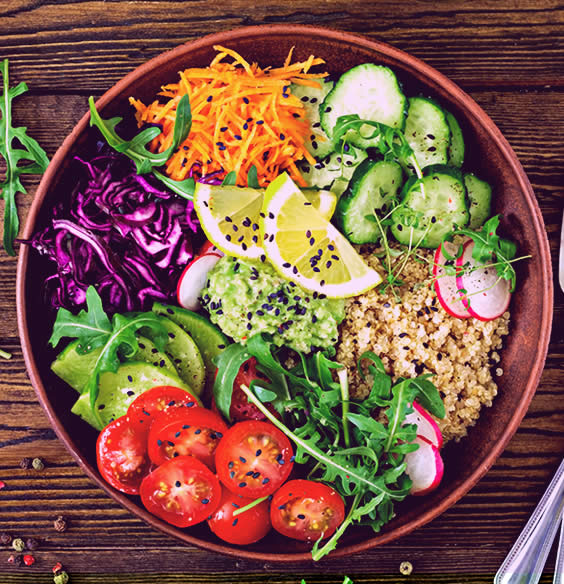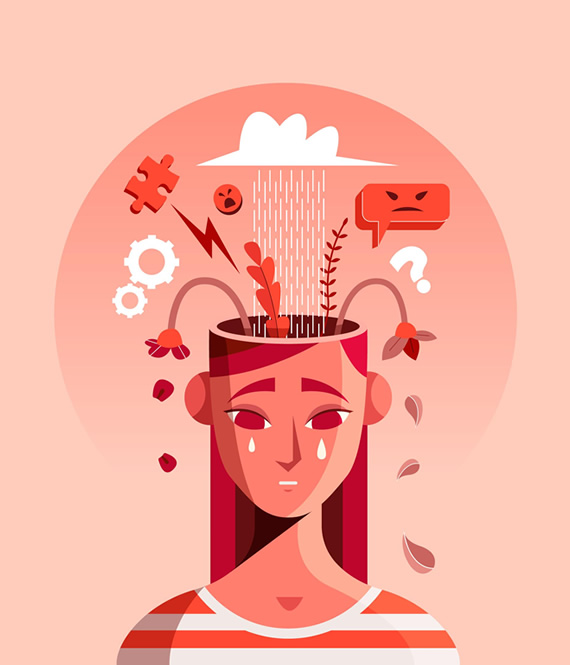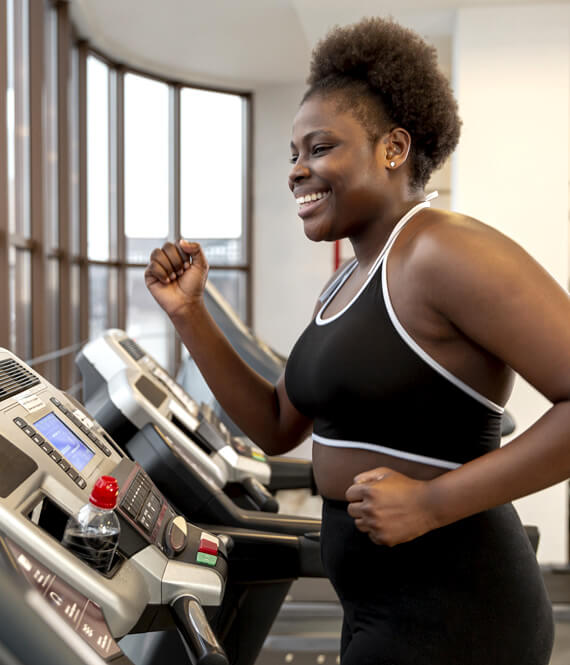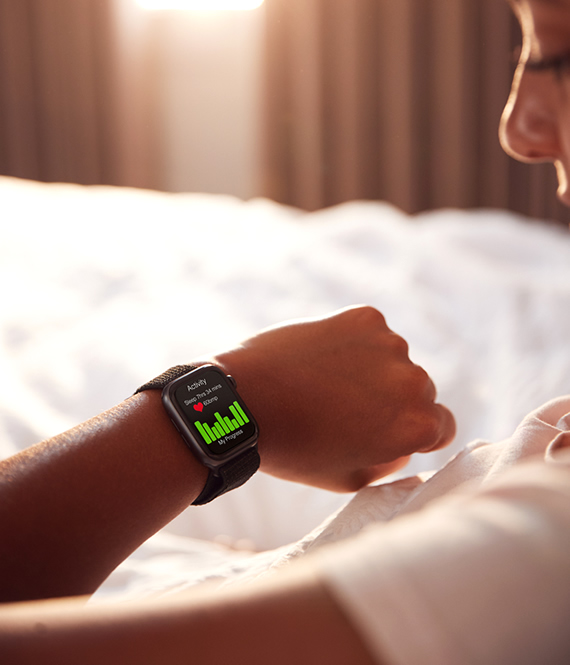
6 Healthy Weight GAIN Tips for Women
We recommend helpful products in our articles. Read our full disclosure here. The content on this website is not intended to be a substitute for professional advice, diagnosis, or treatment.
Gaining healthy weight comes down to adding lean muscle tissue to your body.
The only other alternative is to increase your body’s fat supplies, which is unhealthy.
To gain that healthy weight, you need to follow a balanced nutritional approach and do some strength training exercise.
As a gym owner and personal trainer, I’ve been helping women gain healthy weight for the past 35 years.
Over that time, I’ve been able to distill the steps required to put on pounds of lean muscle tissue down to six rules.
In this article, I’ll share those six rules with you, as well as answer some of the most common questions I get from women about gaining weight.
Step #1: Increase your Caloric Intake
To gain weight you need to create a daily caloric surplus.
In other words, the energy that you take into your body in the form of food calories needs to be greater than the energy that your body uses up to fuel everything you do.
Those extra calories can be used for protein synthesis.
That’s the process that leads to muscle growth.
In order to eat more calories than your body uses, you need to know what your daily caloric maintenance level is.
There are a number of formulas to work this out but the easiest way to is to use a weight gain calculator.
Once you know how many calories you need to meet your daily needs, plan to increase your intake by 500 calories above that number.
That will require counting your calories for the first week or so.
After that, you should have a good idea of what your increased caloric intake looks like.
Step #2: Increase Your Protein Intake
The most important macronutrient for weight gain is protein.
Protein is made up of amino acids, which are the building blocks of the human body.
The recommended dietary allowance for protein is 1.0-1.6 grams per kg of body weight per day.
However, an intake of up to 2 grams per kg has been shown to be perfectly safe for healthy adults.
You should, therefore, plan to eat 2 grams of protein for every kg of your bodyweight.
So, a 50 kg (110 lb) person should be consuming 100 grams of protein every day.
The best high protein foods to consume for weight gain are:
- Eggs;
- Fish;
- Poultry;
- Nuts;
- Dairy Products;
- Legumes.
Step #3: Increase Your Healthy Carb and Fat Intake
In order to meet your increased caloric intake goal, you will need to eat more carbohydrates and fats, in addition to proteins.
However, carb and fat intake need to be controlled to avoid fat gain.
Avoid carbohydrates that are high in sugars and that are highly processed.
Junk food, bakery products, and sugar-laden soft drinks will put weight on, but not the healthy kind.
Starchy carbohydrates are a good source of nutrients like glycogen, fiber, and antioxidants.
Glycogen is especially important as you will need it to fuel the workouts that we’ll discuss in Step #6.
Here are five sources of starchy carbs to include in your weight gain diet:
- Potatoes;
- Quinoa;
- Oats;
- Squash;
- Beans and legumes.
Other healthy carbs to include in your diet are brown rice, cruciferous vegetables like broccoli and cauliflower, and fruit.
Healthy fats are needed to help regulate your body’s hormones, protect against disease, promote optimal digestion, and enhance vitamin uptake.
Fats are also more nutrient dense than carbs and protein.
One gram of fat contains 9 calories compared to just 4 calories for proteins and carbohydrates.
That makes it a valuable tool to help you meet your daily caloric goal.
The best healthy fats for weight gain are:
- Coconut Oil;
- Avocado;
- Dark chocolate;
- Nuts;
- Nut Butter;
- Eggs;
- Wild salmon;
- Olive oil.
Step #4: Increase your Intake of Energy Dense Foods
Eating to gain weight can be a challenge. Protein is a very satiating food, so when you increase your protein intake, you will feel fuller faster.
To meet your caloric goal, you should concentrate on eating healthy whole foods that are energy dense.
An energy-dense food is one that has a high-calorie count relative to its weight. Good examples of healthy energy-dense foods are:
- Vegetables;
- Fruits;
- Whole grains;
- Legumes.
I’ve found that it can really help to add sauces, spices, and toppings to foods to make them more appetizing.
Whipped cream has proven to be a secret weapon that many of my clients have used to meet their daily weight gain calorie goal.
Whipped cream is surprisingly healthy, containing the fat soluble vitamins A, D, E, and K.
Step #5: Improve Your Sleep Quality and Quantity
It is when you sleep that your body recovers from the day’s activities.
It also replenishes and repairs itself.
If you are exercising, which you should be doing, it’s the time that most of your recovery and muscle growth takes place.
According to the National Sleep Foundation, you should get 7-9 hours of sleep every night.
The specific amount we need though differs from person to person.
Determine the ideal length of sleep for you in order to function at your best, and then make sure you get it every night.
Here are half a dozen tips for optimizing the quality and quantity of your sleep:
- Make your bedroom a technology-free zone (yes, that does include your phone!).
- Maintain a dark, cool and quiet bedroom environment.
- Establish a wind-down routine.
- Don’t consume caffeine within two hours of retiring.
- Don’t do or watch things that stimulate you in the hour before going to bed.
- Go to bed and get up at the same time each day.
Step #6: Start a Strength Training Program
In order to turn the extra calories you’re consuming into shapely muscle tissue, you need to stress your muscles with resistance training.
In the absence of exercise, the extra protein will be stored as body fat.
Resistance training places stress on your muscles.
This promotes the body’s general adaptation response.
This response is designed to prepare the muscle to better meet similar stress in the future.
Protein is used to make the muscle slightly bigger and stronger to meet the next challenge.
By starting a resistance training program to get stronger, you will, in effect, be directing the extra calories that you are consuming to the muscles to be used to enhance your shape, rather than to your fat stores to detract from it.
I recommend beginning your strength training program under the guidance of a personal fitness trainer.
This person will be able to construct an exercise program for you that takes your current condition into account.
They will also be able to help you to perfect your exercise technique.
After a few personal trainer sessions, you may decide to exercise at a commercial gym or to set up your own home gym.
Working out at home is as simple as investing in a quality set of adjustable dumbbells, an exercise bench, and a set of resistance bands.
FAQs
Won’t resistance training make me too bulky?
No, resistance training will not make you too bulky.
As a woman, you have far fewer anabolic (muscle building) hormones than men do.
To gain even a small amount of muscle takes a lot of consistent, hard work.
Resistance training will allow you to develop shapely, athletic muscles.
They will only turn you into a bodybuilder if you dedicate yourself to pursue that goal.
Should I do cardio exercise if I’m trying to gain weight?
You should minimize cardio exercise if you are trying to gain weight.
Cardio will burn calories.
That’s great when you’re trying to lose weight but the opposite of what you need for healthy weight gain.
By reducing your cardio, you will be able to preserve the extra calories you are consuming for muscle gain.
It is important to avoid unhealthy foods while cutting back on your cardio.
If you don’t you will end up packing on body fat.
Should I have protein drinks to gain weight?
Yes, I recommend taking protein drinks to help you gain weight.
These drinks will provide you with 20-30 grams of protein that will be quickly absorbed and digested.
Drinking your calories can be a lot easier than eating them.
You should take your protein drink after your workout.
Look for a whey protein isolate protein powder that includes 20-30 grams of carbohydrates.
This will help to replenish your glycogen levels.
Summary
In order to gain healthy weight, you need to consistently eat more of the right types of foods.
The most important macronutrient for weight gain is protein.
You should also include a good amount of healthy carbohydrates and fats.
You should begin a strength training program to turn the extra calories you’re consuming into lean muscle tissue.
Have a few workout sessions with a personal trainer before going out on your own, either in a gym or at home.
Check out this strength training for women program if you need something to help you gain healthy weight.
References
- Wu G.
Dietary protein intake and human health.
Food Funct. 2016 Mar;7(3):1251-65. doi: 10.1039/c5fo01530h.
PMID: 26797090.
- https://www.sleepfoundation.org/how-sleep-works/how-much-sleep-do-we-really-need#:~:text=National%20Sleep%20Foundation%20guidelines1,enable%20their%20growth%20and%20development.
"We love to research problems, examine studies, analyze solutions, and share with you ideas that make life healthier. You can learn about us and our editorial standards here. Have suggestions or feedback to share? Send us a message!."













Leave a Comment